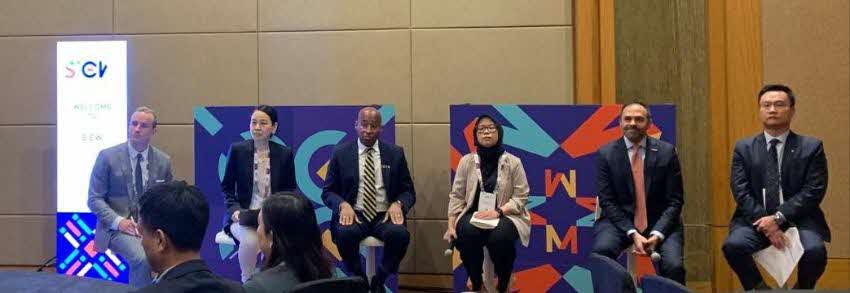Discussions on how South and Southeast Asia's energy transition should be addressed at the upcoming COP28.

The Atlantic Council and the Institute of Energy Economics, Japan (IEEJ) recently hosted a roundtable where energy experts gathered to discuss the energy transition and lay the groundwork for an action plan in preparation for COP28. This is particularly important because the region's average energy demand is expected to triple by 2050, presenting significant challenges in both meeting energy demand and transitioning to cleaner sources.
Presentation by IEEJ
Naoko Doi, Executive Economist, Assistant Director, Climate Change and Energy Efficiency Unit, The Institute of Energy Economics, Japan (IEEJ), commenced the session by presenting insights from the newly released IEEJ Outlook 2023 report. She highlighted that the ASEAN region, a hub of economic growth, is experiencing increased energy demand.
While all member states have committed to net zero targets for 2050 or 2060, she stressed the need for a balanced approach. This approach should support continued economic growth while also implementing realistic pathways towards carbon neutrality.
Ms Doi also emphasised three key points:
- Prioritising cost-effective energy supply due to the rapid economic progress in ASEAN;
- Understanding that energy demand projections will vary significantly based on future growth and energy efficiency assumptions; and
- Recognising the crucial role that gas plays in the energy transition to net zero emissions.
Presentation by Atlantic Council
Marko Lackovic, Managing Director and Partner, Singapore, Boston Consulting Group presented findings from an Atlantic Council study focusing on India and Southeast Asia. He emphasised the importance of accelerating decarbonisation efforts in emerging markets to reduce energy-related emissions. Mr Lackovic also pointed out common challenges in both regions that impede the adoption of necessary clean technologies. These obstacles include the lack of supportive policies and regulations, inadequate infrastructure, limited access to affordable capital, and insufficient incentives for clean technologies.
Additionally, he highlighted that despite these challenges, Southeast Asia offers promising opportunities, including significant solar and wind energy potential and clear clean energy targets.
Expert Panel
Following the two presentations, moderators Reed Blakemore, Director of Research and Programs, Global Energy Center, Atlantic Council, and Ms Naoko invited the panel to share their insights.
Dr Peter F. Green, Deputy Laboratory Director for Science and Technology; Chief Research Officer; Alliance Senior Vice President, National Renewable Energy Laboratory (NREL), highlighted the importance of working towards a net zero world to support countries globally in achieving their clean energy objectives.
He highlighted NREL's dedicated focus on renewable energy and its extensive efforts in areas such as innovative building designs, next-generation buildings, transportation, and industrial processes. Moreover, NREL has provided technical support to Southeast Asian countries, including Singapore, Indonesia, and Thailand, in developing strategies to achieve their decarbonisation targets.
Citra Endah Nur Setyawati, Research Associate, Economic Research Institute for ASEAN and East Asia (ERIA), discussed the significance of hydrogen in the context of decarbonisation. She noted that hydrogen demand has increased in ASEAN countries, primarily driven by ammonia and oil refining. She presented four policy recommendations aimed at shaping the hydrogen economy in the region.
Irtiza Sayyed, President, Asia Pacific, ExxonMobil Low Carbon Solutions, reaffirmed ExxonMobil's commitment to a low carbon future. He highlighted the company's focus on three key value chains: carbon capture and storage, hydrogen and ammonia, and biofuels. Mr Sayyed said these value chains are set to reduce global emissions by approximately 70 percent.
Referencing a report from the International Energy Agency, Kelvin Wong, Deputy Head of Energy Renewables and Infrastructure, Institutional Banking Group, DBS Bank, concluded the roundtable by highlighting that the world is projected to invest a record US$2.8 trillion in green energy deployment. However, he emphasised that to achieve net zero goals, annual investments must increase to US$4.5 trillion or more by 2030.
Follow us on X (formerly Twitter) and Telegram to get the latest updates.